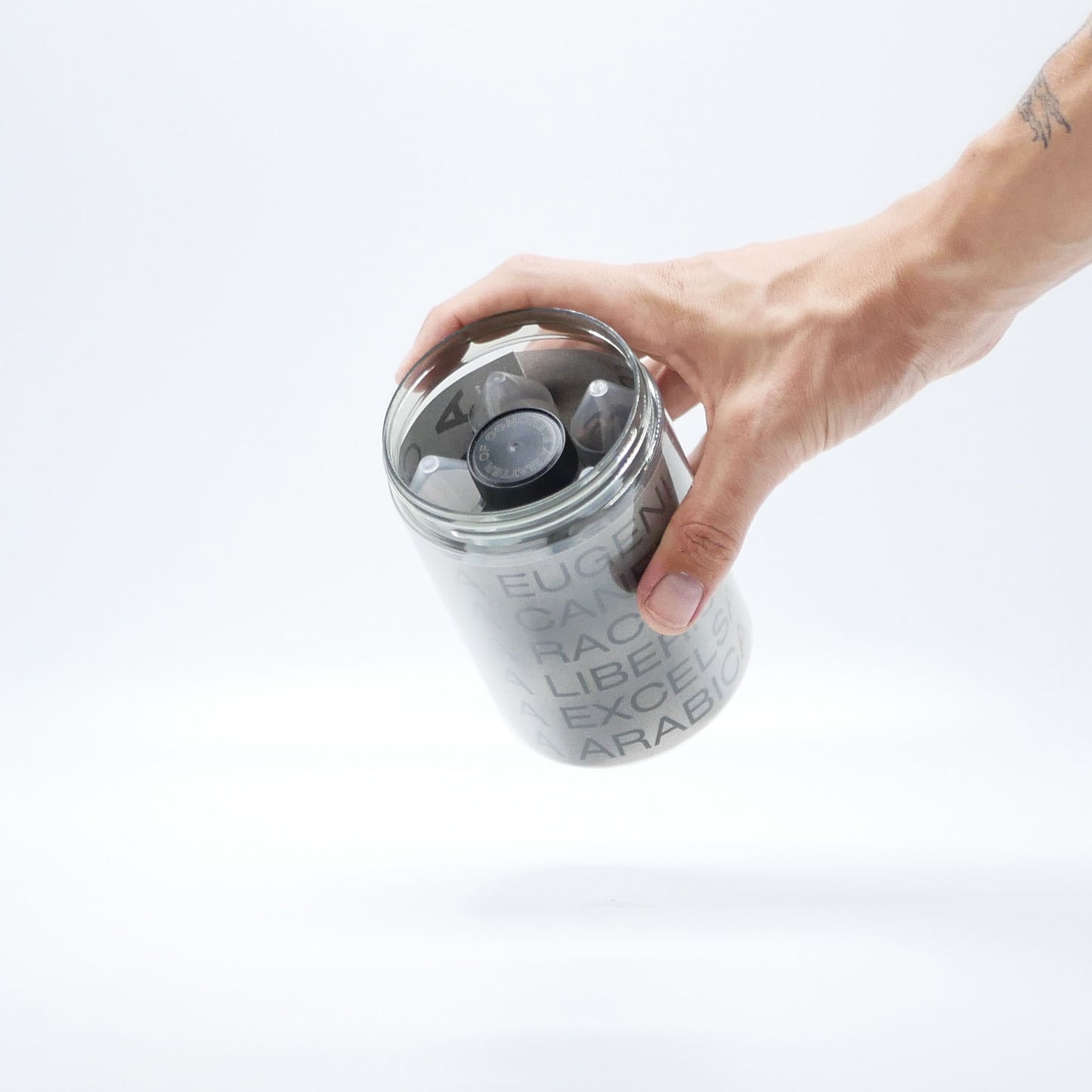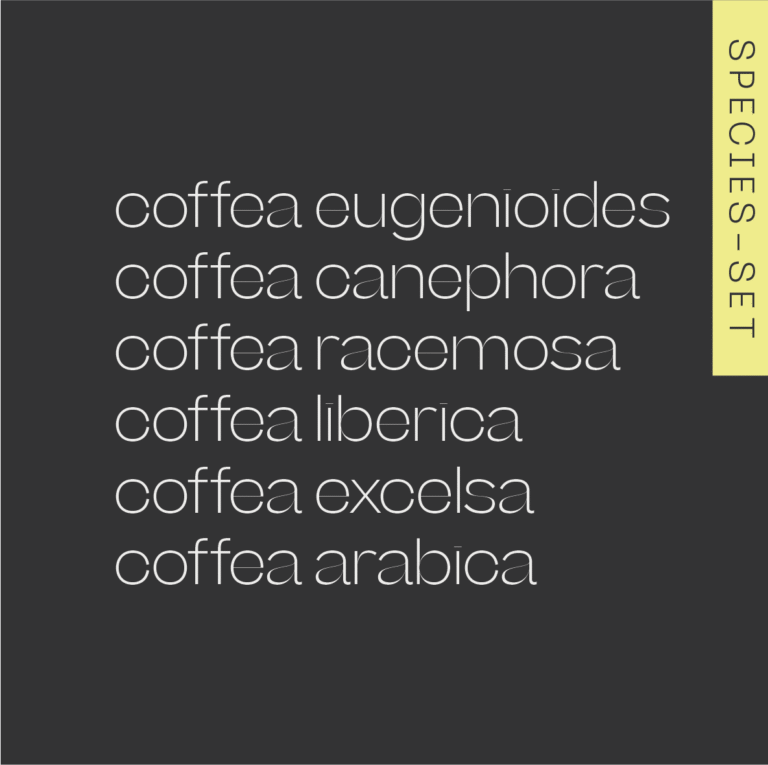1
/
of
2
Willing Coffee
A.M.O.C. Species Set
A.M.O.C. Species Set
Regular price
$140.00 AUD
Regular price
Sale price
$140.00 AUD
Unit price
/
per
Shipping calculated at checkout.
Couldn't load pickup availability
Share
The Species Set by A.M.O.C.
as unique as you can get it
Rotterdam / Netherlands
A tasting set featuring six rare coffee species: Eugenioides, Canephora, Racemosa, Liberica, Excelsa, and Yemenia.
These 15g APEX vials are roasted and dosed for cupping or a single pour-over. Every species comes with its own origin, process, terroir, and taste. Together, they challenge assumptions about what coffee should be and offer a glimpse of where it might go. Expect unusual, expressive, and at times outrageous cup profiles, a sensory dive into the roots of coffee itself.
It’s is a very rare opportunity to taste these. IYKYK
⸻
The Line-Up
⸻
Eugenioides
⸻
Inmaculada Coffee Farm, Colombia
Inmaculada Coffee Farm, Colombia
Species: Coffea eugenioides
Process: Natural Anaerobic
Altitude: ~1800 MASL
Score: 91 SCA
Eugenioides is one of the rarest cultivated coffee species and a genetic parent of Arabica. It’s low in caffeine, high in sweetness, and famously difficult to roast due to its soft density.
Inmaculada’s anaerobic natural process turns it into a lucid, almost otherworldly brew. Think candied lemon peel, bergamot, panela, and a buttery, silky body that feels more like tea or fruit nectar than coffee. A must-cup for any serious taster — this is the same species that underpins award-winning hybrids like Sidra and Rume Sudan.
⸻
Canephora (Robusta)
⸻
Reza Nurullah, Temanggung, Indonesia
Reza Nurullah, Temanggung, Indonesia
Species: Coffea canephora
Process: Natural
Forget everything you know about Robusta.
This is an elevated, carefully fermented canephora grown and processed by Reza, a farmer and fermentation expert in Central Java. It’s clean, layered, and surprisingly elegant, full-bodied with dark chocolate, toasted nuts, spice, and a mellow herbal lift. The best Robusta we’ve ever tasted. No contest.
⸻
Racemosa
⸻
Wild-grown in the coastal forests of KwaZulu-Natal, South Africa
Wild-grown in the coastal forests of KwaZulu-Natal, South Africa
Species: Coffea racemosa
Process: Washed
Elevation: Grown near sea level
Producer: Cultivar
Coffea racemosa is one of the rarest naturally caffeine-deficient coffee species on earth, native only to a narrow coastal belt between northern KwaZulu-Natal (South Africa) and southern Mozambique. Unlike Arabica or Robusta, racemosa grows as a hardy shrub in sandy soils, requiring almost no human intervention and thriving in dry conditions where other species fail.
This particular lot comes from Cultivar, a project that protects wild racemosa populations while exploring its commercial potential in a way that supports biodiversity and local communities. The beans are tiny, the yields are low, and the flavour is unlike anything else.
The washed process brings out its cleanest expression: dry herbs, bay leaf, sage, green melon, and a soft tannic finish. Somewhere between a white tea and a foraged gin botanical. It’s cerebral, subtle, and built for slow tasting.
⸻
Liberica
⸻
Jlegong Village, Temanggung, Central Java, Indonesia
Jlegong Village, Temanggung, Central Java, Indonesia
Species: Coffea liberica
Producer: Reza Nurullah
Process: Experimental Honey (Anaerobic with Yeast Inoculation)
Altitude: 850–900 MASL
This one’s wild.
Reza’s tiny lot of Liberica was fermented using a homemade yeast inoculation in a sealed tank, then processed as a honey. The result is intense and divisive, with notes of Coca Cola Light, artificial sweeteners like Stevia, and old-school Dutch liquorice sticks (literally: Glycyrrhiza glabra). Some spice, some funk, and a whole lot of what the hell is this?
An experience-coffee. Not elegant, not subtle, but unforgettable.
⸻
Excelsa
⸻
South India Coffee Company, Tamil Nadu, India
South India Coffee Company, Tamil Nadu, India
Species: Coffea excelsa (aka Coffea liberica var. dewevrei)
Process: Washed
Elevation: ~1000–1200 MASL
Farmers: Uzhavar collective
Excelsa is often (mis)classified as a Liberica variant, but its profile is entirely its own. Cultivated in a small agroforestry project in South India, this washed lot is clean, bright, and refreshingly high-acid.
Expect citrus peel, rhubarb, pink grapefruit, and a snappy, floral finish. This species was nearly extinct in cultivation, now it’s coming back with a completely different energy.
⸻
Yemenia
⸻
Hayma Kharijiya, Yemen
Hayma Kharijiya, Yemen
Species: Yemenia (Arabica mutation)
Process: Natural
Lot: Peaberry (5–10% of harvest)
Yemenia is a newly discovered, genetically distinct mutation of Arabica found in the mountains of Yemen. This peaberry lot — rarely representing less than 5% of the total harvest — was naturally processed on raised beds and sun-dried in a region known for its ancient coffee lineage.
It’s intensely sweet and perfumed: rosewater, red berries, stonefruit, and creamy chocolate. It drinks like a classic Yemen natural but with more clarity and lift, a perfect final chapter in this species journey.
⸻




